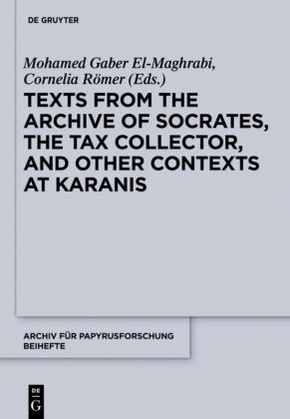Texts from the 'Archive' of Socrates, the Tax Collector, and Other Contexts at Karanis - Papyri Cairo Michigan II (P. Cair. Mich. II )
| Verlag | De Gruyter |
| Auflage | 2014 |
| Seiten | 148 |
| Format | 17,0 x 1,3 x 24,0 cm |
| Gewicht | 431 g |
| Artikeltyp | Englisches Buch |
| Reihe | Archiv für Papyrusforschung und verwandte Gebiete - Beihefte 35 |
| ISBN-10 | 3110342154 |
| EAN | 9783110342154 |
| Bestell-Nr | 11034215A |
Die Zeitschrift Archiv für Papyrusforschung und verwandte Gebiete ist das älteste papyrologische Fachorgan der Welt. Sieunterscheidet sich von anderen papyrologischen Zeitschriften hauptsächlich durch ihre Referate (literarische Papyri, christliche Texte, Urkundenreferat, juristisches Referat, koptische Texte und Urkunden, Demotica Selecta sowie Darstellungen und Hilfsmittel).
Die Beihefte zu der Zeitschrift vereinen sowohl Monographien als auch Sammelbände; im Zentrum stehen Neueditionen von Papyrustexten griechischer, lateinischer, koptischer, demotischer oder arabischer Sprache, die neue Erkenntnisse zu verschiedenen Bereichen des Altertums vermitteln: zu Philologie, Literatur, Philosophie, Religion, Politik und Sozialgeschichte, zu Militär- und Rechtsgeschichte, zu Geographie und Landeskunde, zu Schul- und Gesundheitswesen und zum Alltagsleben; kurzum, zur antiken Kulturgeschichte überhaupt.
This volume of Papyri contains a selection of 25 pieces which were excavated in the village of Karanis in the north-eastern Fayum (Egypt) by American archaeologists between 1924 and 1926.
Many of the texts published here come from the archive of a well known figure in the village life of Karanis in the 2nd century AD: Socrates, son of Sarapion, was a tax collector here for many years, serving the Roman Empire collecting taxes due in money and in kind. Besides his successful economic activities - Socrates certainly belonged to the upper stratum of society in Karanis - the tax collector was a lover of Greek literature; for sure, he did not venture into high philosophy and the like, but he read Homer, comedies, and tried to be up to date about mythology in plays.
Half of the new texts published here are literary, mostly from Socrates' library; other texts were found in the immediate neighbourhood of where Socrates lived, such as a surgical treatise about remedies of shoulder dislocations, which perhaps belonged to a doctor. The other half of the papyrus texts in this volume are documents that can shed new light on the activities of the tax collector, or of other inhabitants of Karanis. Altogether they give us a vivid picture of village life in Graeco/Roman Egypt in the 2nd century AD.

